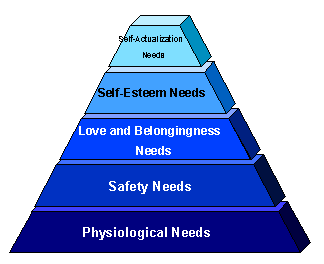|
A buona volontà, non manca facoltà English Equivalent Where
there's a will there's a way
Motivation, Goal Setting, and Success |
||||||
Motivation is the combination of desire, values, and beliefs that drives you to take action. These three motivating factors, and/or lack of them, are at the root of why people behave the way they do. Because you ultimately control your values, beliefs, and desires, you can influence your motivations. This means, if you consider something important and assign value to it, you are more likely to do the work it takes to attain the goal. When motivation originates from an internal source and is combined with a realistic goal and circumstance, the odds of a good outcome are greatly increased.
An internal desire or need to want
or do something no matter what others think, In order to get motivated and stay motivated, try the following: 1) identify your values, beliefs, and desires, 2) recognize your strengths and weaknesses and use this information to establish realistic goals, 3) understand the role of personal circumstance, and 4) realize that success is the merger of all three factors.4) Use available tools |
||||||
Values, Beliefs, and Desires To understand what motivates us you, you'll need to understand what is important to you. If you have never thought about this question, do it now. Consider issues such as family, relationships, learning/school, grades, work, aspirations, achievement, status, money, travel, social causes, social life, following a dream, etc.People's goals and desires grow from their values and beliefs. Once you have made your personal list, begin to think about how the items relate to one another. Are some issues more important to you than others? Are some more important in the short-term while others are more important in the long term? Are they linked in some critical way? These issues and relationships are always alive inside us. By becoming consciously aware of them, you can begin to modify, control and understand them.
Free yourself to achieve more in life, with ease and grace Judging the quality and depth of your motivation is important, because it is directly related to your commitment. Often people find that they "want" a good academic outcome, but they can't seem to make it happen. Sometimes, this gap occurs when there is a clash between what they are striving for (a good academic outcome/degree) and what they would rather be doing (following a dream of singing in a country-western band). It's OK for values, beliefs, and desires to be in conflict, but it is important to recognize when they are and act appropriately on this information. In the example above, this student needs to both rethink and internalize the relationship of school and dream or she needs to change her circumstances. But without such a clarification her motivation will continue to lag and her performance will be less than it could be.
Motivation is the combination of desire, values, and beliefs that drives you to take action. These three motivating factors, and/or lack of them, are at the root of why people behave the way they do. Because you ultimately control your values, beliefs, and desires, you can influence your motivations. This means, if you consider something important and assign value to it, you are more likely to do the work it takes to attain the goal. When motivation originates from an internal source and is combined with a realistic goal and circumstance, the odds of a good outcome are greatly increased. |
||||||
The word self-motivation usually means something more. It usually implies that some people can "motivate" ourselves even in situations that don't appear very condusive to motivation. These situations may lack the external incentives and/or rewards or punishments that usually help motivate people. Perhaps these rewards are very delayed or uncertain. Some people are good at working hard toward delayed or uncertain consequences and others aren't so good at it. Early philosophers called this quality "will power" or "self-discipline." Freud called it "ego strength." Some now call it "internal control." Whatever it is called, it is a quality that research has shown to be a very important component of mental health, success in almost every area of life, and in personal happiness.
|
||||||
27 questions to measure how close you are to having an ideal mindset for success Strengths, Weaknesses and Goal Setting Having an accurate direction is important in maintaining motivation. Knowing what you value and desire, makes it possible to establish personal goals. Most people already have a mix of short-term and long-term goals of some type in mind for themselves. People often are aiming towards a particular goal, degree, graduate program, professional school, or career. These are often complemented by other goals such as living a healthy lifestyle, maintaining personal integrity, volunteering, working, nurturing relationships, or growing as a person. It is not unusual for short-term goals to support long-term goals. For example, a persons long-term goal to become more healthy,might be supported by a series of short-term goals related to weight loss, eating habits, excersise, procrastination and commitment. All goals, whether short-term or long-term, should incorporate these common attributes:
Motivation is a key to all success
and achievement. So, how are you motivated? · Be realistic. · Be possible. Don't establish constraints that make the realistic, unrealistic. · Be flexible. Anticipate bumps in the road and expect to work around them. · Be measurable. Have a target in mind so you know when you have reached your goal.
The Top Ten Strategies to Employ When You Feel Like Quitting Be under your control. Set your own goals based on your values, interests, and desires. Target things where you can control the outcome. Write down your goals and post them somewhere you can review them regularly. This will serve as a reminder of what you're working toward and help to keep you motivated and on track. When your goals slip from sight and lose importance, motivation and success deteriorate as well. |
||||||
Personal Circumstance Once you have set goals that match your beliefs, values and desires, you should be in position to act on them successfully. However, your motivation can be undermined if you fail to consider your circumstances or if your circumstances change, but your goals don't. A goal may match your values ("I want to loose weight,become more healthy,") and may be realistically set ("I want to do it in 1 year") when you begin your journey, but may need modification and readjustment as time passes. If your weight loss is lower than you expected , you may just need to reassess. A loss of interest might mean you need to investigate other short term goals. Changes in relationships or family make-up can also introduce new constraints on your plan.
27 questions to measure how close you are to having an ideal mindset for success Unfortunately, when circumstances change, we are often unwilling to make related adjustments in our self-expectations. In these cases, we rarely perform up to our expectations, become frustrated, and lose motivation. However, motivation and performance can be maintained when personal circumstance is taken into account. Sucessful people are often those who are willing to redefine their goals, to account for their changed circumstances and remain motivated and on the path to success. Motivation + Goals + Circumstance = Success Motivation, goals, and circumstance are all related to success. You can increase the odds of your success by first, defining what is important to you, establishing goals based on these values, desires, and beliefs, and finally, tailoring your achievement expectations to match your circumstances. Watch out for common pitfalls: · If you're not honest with yourselves about what is important to you and how these factors relate to each other - you can be in a position where you are acting on weaker motivations, but allowing your stronger motivations to interrupt your progress. For example, a student might be in school and performing poorly because she really wants to be establishing her own web-based business. In this case she either needs to commit to a reprioritization of values (school is more important than the dream) or adjust her goals to better match her desires and say "I'll follow my dream first and then go to school". Watch out for a mismatch of values/beliefs/desires and goals.
|
||||||
When your goals are realistic
and match your desires, you will be motivated. When you're motivated
and work hard towards your goals, you
will succeed. When you succeed,
your motivation will grow, you will set new goals, and continue to
achieve. Successful performance at just about anything requires that you be able to keep yourself motivated. Discouragement and lack of motivation hits everyone at some time or another. The more techniques and tools we have to help us restart our engine or to keep it going when things get tough or boring, the more successful we will be. Does it seem like you're always Take heart! You're simply in step with the natural rhythm of progress! Progress toward your goals is never going to be a straight line. There are always bumps in the road to send you off course. The trick is to avoid getting discouraged and get back on track. How? Follow these links
Create within you, permanently high levels of self-motivation. Create in you, an automatic resistance to procrastination. Overcome quitting and failure -once and for all!
Enthusiasm is one of the most powerful engines of success. When you
do a thing, do it with all your might. Put your whole soul into it. stamp
it with your personality. Be active, be energetic, be enthusiastic and
faithful, and you will accomplish your object. Nothing great was ever
achieved without enthusiasm."
thanks to Tom G. Stevens PhD |










